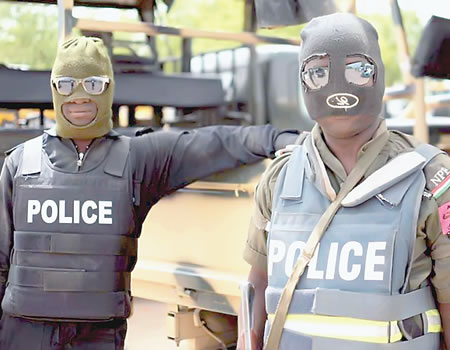
A few days back when a former governor of Cross River state, Donald Duke, declared his intention to run for president on a social media platform, twitter, one of the main questions posed to him by those who responded to his request for support and votes, is if he would end SARS, a national campaign directed at stopping the terror being unleashed on Nigerians by a special police operation known as Special Anti-Robbery Squad. The operation, meant to curb armed robbery, but now seen as mainly oppressive, brutal and an extortion agenda, has seen many innocent Nigerians fall victim. For good measure, Nigerians, particularly Lagosians, are not keeping quiet about it, leading to the launching of the #EndSARS campaign.
The recent near-fatal shooting of a prominent politician, Opeyemi Bamidele, by a policeman drafted into an illegal operation from Lagos to Ekiti State, has called more attention to the issue of policemen on illegal duties with its attendant risks.
But the police authorities in Lagos State have denied keeping any officers or policemen who operate with unmarked vehicles to extort money from commuter bus drivers and other motorists.
The command advised Lagos people to take advantage of the toll-free lines instituted by the Commissioner of Police to report any case of lawlessness involving any man or woman on the police force.
Rent-a-driver
Findings by Saturday Tribune showed that one major way policemen on illegal duties try to cover their tracks is by using commercial vehicles to conduct such assignments. They rent them for a fee.
Our agonies –Brutality, extortion victims
Cases of misuse of power and privileges by uniformed men and officers have continued to experience a spike despite the groundswell of citizen opposition and advocacy against them. In nearby Ogun State, the matter got to a head when the state government waded in when the cries of the people became deafening.
The state government legislated against involving soldiers in civil matters. Defaulters could be tried for attempted murder in courts under the state jurisdiction, with accused persons being liable to about five years in prison. The anti-brutality, anti-extortion law has since brought some respite to the civilian populace in Ogun State.
90 officers sanctioned
If verifiable statistics are anything to go by, it will be unfair to accuse the police authorities in the state of condoning their errant officers. Recent records show that the police force has meted out disciplinary measures against its men found to have applied excessive powers against innocent civilians.
For instance, three policemen comprising an inspector and two sergeants got sacked recently over an incident in Chinese Town, Ojota. They were alleged to have tear-gassed one Mr Ademuwagun Temitope Solomon and provoked an asthmatic crisis in him.
In its half-year disciplinary record, the force said: “In keeping with its promise to regularly update Lagosians about the activities of the command, the Lagos State police command wishes to inform members of the public that the Commissioner of Police, CP Imohimi Edgal, has dismissed the three policemen comprising an inspector and two sergeants who were alleged to have sprayed tear-gas on Mr Ademuwagun Temitope Solomon which provoked severe asthmatic crisis in him.”
A police statement which revealed the record was signed by the Police Public Relations Officer, Lagos State Command, Mr Chike Oti, a Superintendent of Police. The statement said the affected men were tried in an orderly room and were found guilty as charged. They were therefore dismissed and de-kitted accordingly, it added.
“Similarly, the Command wishes to use this medium to re–lease its half year disciplinary record for the period spanning from January to June, 2018. The officers were tried in a properly constituted orderly room and were found guilty of various offences against discipline which earned them appropriate punishments depending on the charges against them,” the statement said.
A breakdown of the types of punishment awarded to deserving officers showed that eight were dismissed, four got reduction in rank, 28, warning notice and five discharged and acquitted.
“The Commissioner of Police said that this would serve as a deterrent to other policemen wishing to toe the path of infamy, that the Nigeria Police under the watch of the Inspector General of Police have no room for them. He warned all serving police officers to be professional at all times in the discharge of their duties and shun corrupt practices,” the statement said.
ALSO READ: Suspected cultists: Don’t link me or Saraki ―Ahmed
Police disclaim ‘police’ operations in private vehicles
The Police Spokesperson in charge of Zone 2 comprising Lagos and Ogun States, Dolapo Badmos, said that since the issues had got to the extent of being under investigation, the Lagos State Commissioner of Police, Imohimi Edgal, would be in the best position to respond to the questions raised by Saturday Tribune.
However, the Lagos State Police Public Relations Officer, Mr Chike Oti, said the command had no police officers operating with unmarked vehicles to extort money from commuter bus drivers and other motorists. He advised the people of the state to take advantage of the toll-free lines instituted by the Commissioner of Police to report any case of lawlessness and extortion involving police officers in the state.
“We don’t have regular policemen in Lagos going about in unmarked vehicles extorting money from motorists. The Commissioner of Police is at the forefront of dealing with policemen who misbehave. Everybody knows him for that. He is a no-nonsense fine officer.
“Policemen in Lagos know that the CP has set up a Citizen Complaints Centre with dedicated phone lines that are toll-free. Anything that has to do with unprofessionalism by policemen in Lagos should be reported immediately to the centre.
“Call the centre; we have officers there for 24 hours who attend to people. It doesn’t matter the language you speak. If you can’t speak English Language, speak in any of the major Nigerian Languages. So, if you tell me that policemen are moving about in unmarked vehicles extorting money from motorists, it is not true,” Oti said.
Commenting on the pictures of rented vehicles by policemen spotted on different locations in the state, especially Badagry-Mile 2 Expressway and Igando-Iyana-Iba axis of Lagos, Oti said that there was no evidence of any policeman collecting money in the said pictures provided by Saturday Tribune.
Way out
A cross section of Lagos residents who spoke to Saturday Tribune said the excesses of armed security operatives, particularly the police, required more definitive approach. Many advised the authorities in Lagos to take a leaf from its Ogun State counterpart, in reining in unscrupulous personnel.
“There is nowhere in civilised world where armed security personnel trample on innocent and defenseless civilians as badly as in Lagos. The rights of Nigerian citizens generally are being trampled upon on a daily basis and the authorities must find a way to rein in unruly armed security personnel,” said Mr Vincent Ogunmola, a lawyer.
The principal partner at Vincent O. Ogunmola & Co. Chambers urged the National Assembly to look into abuse of rights of citizens by armed security personnel in the country. He noted that there are provisions of the constitution against such unruly acts but regretted that erring police officers are always protected by their superiors who ought to initiate punishment procedure against their lawless subordinates.
“The rights of Nigerians are being trampled upon on a daily basis by armed security personnel, particularly the police. Unfortunately, in all cases, they get away with it. The police and all similar security organisations in the country, the army, navy, are working directly against the provisions of the constitution of the Federal Republic of Nigeria. For instance, Section 33 to 36 lay down the rights which Nigerian citizens are entitled to. The whole of the rights provided in the constitution are being trampled upon by security agencies.
“Imagine the police, particularly SARS, arresting somebody on the grounds that he is having a big smart phone, and they will ask him to open up his phone. As a citizen of the country, he is entitled to the privacy of his life. The excesses of the police are such that when they even kill their victim, they find a way to cover up and issue a statement that the victim challenged the officers.
“I am particularly worried the way the rights of average Nigerians are trampled upon. It happens on a daily basis. There is no day you won’t get to hear one crime or the other which the police are involved in, particularly, the so-called SARS. I have had a case where I went to admit somebody to bail at the SARS office and the police demanded as much as N150,000 for bail and denied receiving the money. It was purely a civil transaction which is now in court with a suit number HCT/826/17, High Court 6, Ota, Ogun State. The complainant went to engage SARS to recover money involved in land transaction in which the sellers offered credible alternatives for resolution. Notwithstanding the fact, they have written on their notice board that police bail is free they would collect the money and deny it.
“In all honesty, it is once in a long while that you get to hear about soldiers being involved in unruly behavior. In all fairness to the Nigerian Army, in some cases when it happens that a soldier trampled upon the rights of an individual, the erring soldier is punished unless the victim does not report the matter or the personnel cannot be identified,” Ogunmola added.
Mr Uche Ogbonna, a legal practitioner in Ijebu-Ode, Ogun State, said the average civilian should be made to realise that armed security personnel are subject to civilian population in a democracy, adding that it is for this reason democracy is regarded as the best form of government.
“What I am saying is that we are supposed to know our rights as individuals and as a people. We can as well resort to petition. When we experience such abuse of rights of citizens, we should petition appropriate authorities.
“The army formation as an institution has very stabilised members. If a victim petitions, I am sure that the issue will be addressed. I think the same thing is applicable to the police. I do not like a situation where anybody will condemn the entire army or police formation. In the context of the police, there are very fine, well behaved policemen.
“Don’t forget that the police and the army are a product of the larger society called Nigeria. Instead of fighting back or insulting them, we should lodge complains to the appropriate authorities,” Ogbonna said.
The Ogun State example
The legal practitioner said citizens should take advantage of the websites of the police and the army. “You know they have active websites. That has become the trend in Ogun State. Police or Army excesses are now minimal in Ogun State because the citizens now take advantage of the websites to lodge complaints against erring uniform men. As soon as there is a case of misconduct against any uniform personnel, they quickly contact Abuja. Don’t forget, this thing cannot stop in one day. It is a process. Gradually, we will get there,” said the lawyer.
According to him, if an individual gets offended, there is the idea of people inviting soldiers to intervene in matters that should absolutely be for the police. What goes on now in Ogun State is that judges and magistrates don’t take it lightly anymore. If an individual does that, the authorities in Ogun State, particularly judges and magistrates, frown on it because this is no longer military government.
You don’t do that anymore. If there is any misunderstanding, the police should be invited and not soldiers. The Army are exclusively trained for the defense of external aggression and not to handle matters between individuals.
Speaking on states’ helplessness, Ogbonna said: “The Police and Army are on the exclusive list of the constitution. This implies that the federal government is the only authority that has the power to punish an erring police man or soldier.
“The governor of a state is made the chief security of that state only on paper, not in practical terms. The governors don’t really have powers over the police and the army; but they can as well call them to order. But in terms of punishing them, they don’t have such powers.
“And if they make any law in matters of the police and the army, if it is in conflict with the provisions of the constitution even if intended to protect the civilian populace, that law will have no effect. Until the constitution is amended, the country has to live with this sad situation.
“This is why Nigerians are calling for restructuring of the country. What restructuring simply means is that the government should amend the provisions of the constitution so that states can have greater control and participation in handling certain aspects of the constitution. It is also for this reason that people are calling for state police, just to make room for states to have major control over security situations.”
What Police Ordinance says
In a survey conducted by Saturday Tribune among Lagosians, one glaring fact is the poor understanding, or total lack of it, of what should be the relationship between the police and other service men on one the hand and the civil populace on the other. Here is what the people should know about police constitutional power and illegality.
The law says: “The police shall be employed for the prevention and detection of crime, the apprehension of offenders, the preservation of law and order, the protection of life and property and the due enforcement of all laws and regulations with which they are directly charged, and shall perform such military duties within or outside Nigeria as may be required of them by, or under the authority of this or any other Act. [1979 No. 23]”
Similarly, the powers of police are exhaustively dealt with in Part IV of the Police Ordinance Act. However, the provisions of the law on Part IV of the Ordinance Act clearly define police power to arrest with or without a warrant issued by a competent court. Despite the proviso, police do not have blanket powers to detain and search suspected persons.
According to the provision, a police officer may detain and search any person whom he reasonably suspects of having in his possession or conveying in any manner anything which he has reason to believe to have been stolen or otherwise unlawfully obtained.
But they have blanket power of arrest. Subject to the provisions of Police Act Part IV, Schedule 24 and 25, relating to powers of Police Officers to arrest with or without legal warrant, and Schedule 28 relating to the power to search, officers are given blanket power which they have relied upon to harass and intimidate innocent citizens.
In Schedule 25 of the same Police Act, Part IV dealing with the power to arrest without having warrant in possession by police officers are further empowered thus:
Any warrant lawfully issued by a court for apprehending any person charged with any offence may be executed by any police officer at any time notwithstanding that the warrant is not in his possession at that time, but the warrant shall, on the demand of the person apprehended, be shown to him as soon as practicable after his arrest.
Investigations show that in most cases, officers and men of the force rely on these sections to justify unwarranted and unnecessary arrest of innocent civilians.
No provision for stiff sanction
In the Police Act, there are no provisions for stiff sanctions against wayward police officers except in Part VII which states that the ordinary course of the law shall not be interfered with. Schedule 44 of Part VII dealing with non-interference with the ordinary course of la w states: “Nothing in this Act shall be construed to exempt any police officer from being proceeded against by the ordinary course of law when accused of any offence punishable under any other Act or law.”
…Army’s provision
Part XII, Schedule 104 to 114 of the Armed Forces Act, Laws of Federation of Nigeria, however, outlined a range of conducts to prejudice of service discipline and which are offences under which any serving soldier may be tried and punished accordingly.
On Schedule 104 of the Army Ordinance Act, dealing with Civil Offences, any soldier on trial by a court-martial on allegation of assault, grievous harm and aggravated assault is liable, on conviction, to imprisonment for a term not exceeding seven years or any less punishment provided by this Act.
On assault, the law further stipulates the following:
(1) A person subject to service law under this Act who, with unlawful force or violence, does or attempts to do any bodily harm to another person is guilty of assault and liable, on conviction by a court-martial, to imprisonment for a term not exceeding two years or any less punishment provided by this Act.
(2) A person subject to service law under this Act who-
(a) unlawfully assaults another person with a dangerous weapon or other means of force likely to cause death; or is guilty of aggravated assault and liable, on conviction by a court-martial, to imprisonment for a term not exceeding seven years or any less punishment provided by this Act.
(b) unlawfully assaults another person and thereby does him grievous harm,
Schedules 105 and 106 which deal with manslaughter and murder respectively provide thus:
A person subject to service law under this Act who-
(a)unlawfully kills another person in such circumstances as not to constitute murder; or
(b) with intent to kill or do some grievous harm to another person, unlawfully kills that person in the heat of passion caused by sudden provocation, and before there is time for his passion to cool, is guilty of manslaughter and liable, on conviction by a court-martial, to imprisonment for life.







